Toronto-made The Big Con is a ’90s con artist game that got featured by Tribeca Film Festival
Over the past few weeks, there have been a bunch of games showcases focused on indie titles hailing from all over the world.
Between Wholesome Direct, Steam Next Fest, Devolver Digital’s ‘MaxPass Plus’ and the 2021 Guerrilla Collective, there was certainly no shortage of promising indie games on display.
But only eight indie developers can say that they were featured in the first-ever Tribeca Games Spotlight, which was put together earlier this month by the world-famous Tribeca Film Festival. What’s more, just one of those studios was Canadian — the Toronto-based indie developer Mighty Yell.
Tribeca spotlit the four-year-old Canadian studio’s debut title, The Big Con, an adventure game about a teenaged con artist in the ’90s who tries to raise money to save her mother’s video store.
“We were floored. This is not only the first Tribeca [Games Spotlight], but we were in it,” says Dave Proctor, The Big Con‘s writer-director. “And we were one of eight. I was like, ‘How many are there, 100? No, eight?’ Yeah, I’m still taken aback by it — I’m still so proud.”
The eight games in question were selected by an advisory board consisting of several big figures in the entertainment industry, including Toronto-born The Game Awards creator Geoff Keighley, Metal Gear creator Hideo Kojima, The Mandalorian creator Jon Favreau and Max Payne writer Sam Lake.
Impressively, Mighty Yell even managed to get Sabrina the Teenage Witch star Melissa Joan Hart to introduce The Big Con at Tribeca. “That was wild — that was the icing on the cake for this whole thing,” says Proctor.
Thank you @MelissaJoanHart for helping us introduce our teen con artist game, #THEBIGCON to the world at @Tribeca ????????https://t.co/FeZZq3HiSO pic.twitter.com/9pzUSfUCD1
— The Big Con COMING SOON! ✨Wishlist on Steam!✨ (@MightyYell) June 11, 2021
He credits the team’s marketing director, Corina [Diaz], for discovering the whole Tribeca opportunity and applying for the team. This was especially helpful, he says, as the core team consists of just six people. “As the guy who’s doing the writing and game design, having someone who was in charge of marketing and visibility […] is such a huge benefit and privilege,” he says.
This helped Proctor focus on realizing the game’s vision, which he says comes from years of reverence for con artist stories and ’90s nostalgia.
“I’m a big fan of period-based nostalgia but not specific references. I didn’t want the game to be ‘the Clintons!’ ‘Nirvana!’ We wanted it to feel like you’re in the ’90s, so a lot of that is aesthetic-based,” he explains. “There are some references, too — landlines, teenagers having their own phone line, I think I mentioned Pearl Jam once in the game.”
In keeping with the ’90s vibe, Ali even has an imaginary friend named Rad Ghost. “He’s just this guy who looks like a ’90s bedsheet. Canonically, in our heads, he’s also the ghost of an MTV VJ, although we never say that,” Proctor says with a laugh.
The game’s whimsical tone, meanwhile, comes in no small part due to its colourful aesthetic, which Proctor attributes to art director Saffron Aurora.
“We wanted to try something that was inspired a little bit more by 90s comics and cartoons. So she started looking at Nickelodeon and stuff, and I was like, ‘also check out comics like Ghost World, look at the way that’s shaded and heavy line drawings and stuff,” he says.
“But there was a big part of her that remembered or watched a lot of [’90s content]. People say Doug a lot of time because it’s got those big thick black lines and bright colors and stuff like that, and I think there’s a there’s a lot of truth to that. But we also just wanted something that was bright and colorful.”
On the music front, composer Dan Rodrigues has lent The Big Con a decidedly upbeat and laidback score. But Proctor also got to leverage his own Toronto band experience alongside Rodrigues and his friend Matt Winkler in an exciting way. To add to the ’90s feel, Mighty Yell worked with Rockapella, the a capella music group behind the nostalgic theme to the ’90s PBS show Where in the World is Carmen Sandiego?, to create The Big Con‘s theme song.
“[Mighty Yell] wrote the song, we were like ‘this is what needs to happen for the song,’ and we gave it to Rockapella and they gave it back to us and we’re like, ‘wow, what have you done? This is beautiful!’” says Proctor of the Rockapella collaboration.
Overall, though, Proctor doesn’t want The Big Con to solely be about nostalgia. “It’s more about creating an atmosphere and a feel. To me, the stories kind of emerge from that.”
The key story there is Ali’s, who undergoes her own coming-of-age journey amid her grifting. It’s a narrative that Proctor worked out early on with Jill Murray, a prolific games writer who’s worked on such titles as Eidos Montreal’s Shadow of the Tomb Raider, Ubisoft Montreal’s Assassin’s Creed IV: Black Flag and Unknown Worlds’ Subnautica: Below Zero.
“We were kind of like, ‘Who is this character? Who is Ali?’” says Proctor of his early conversations with Murray. “She’s this kind of sarcastic ’90s protagonist [who] also has these hang-ups about wanting to live her own life that don’t necessarily involve becoming a famous musician like her mom wants. That kind of resonated with both of us.”
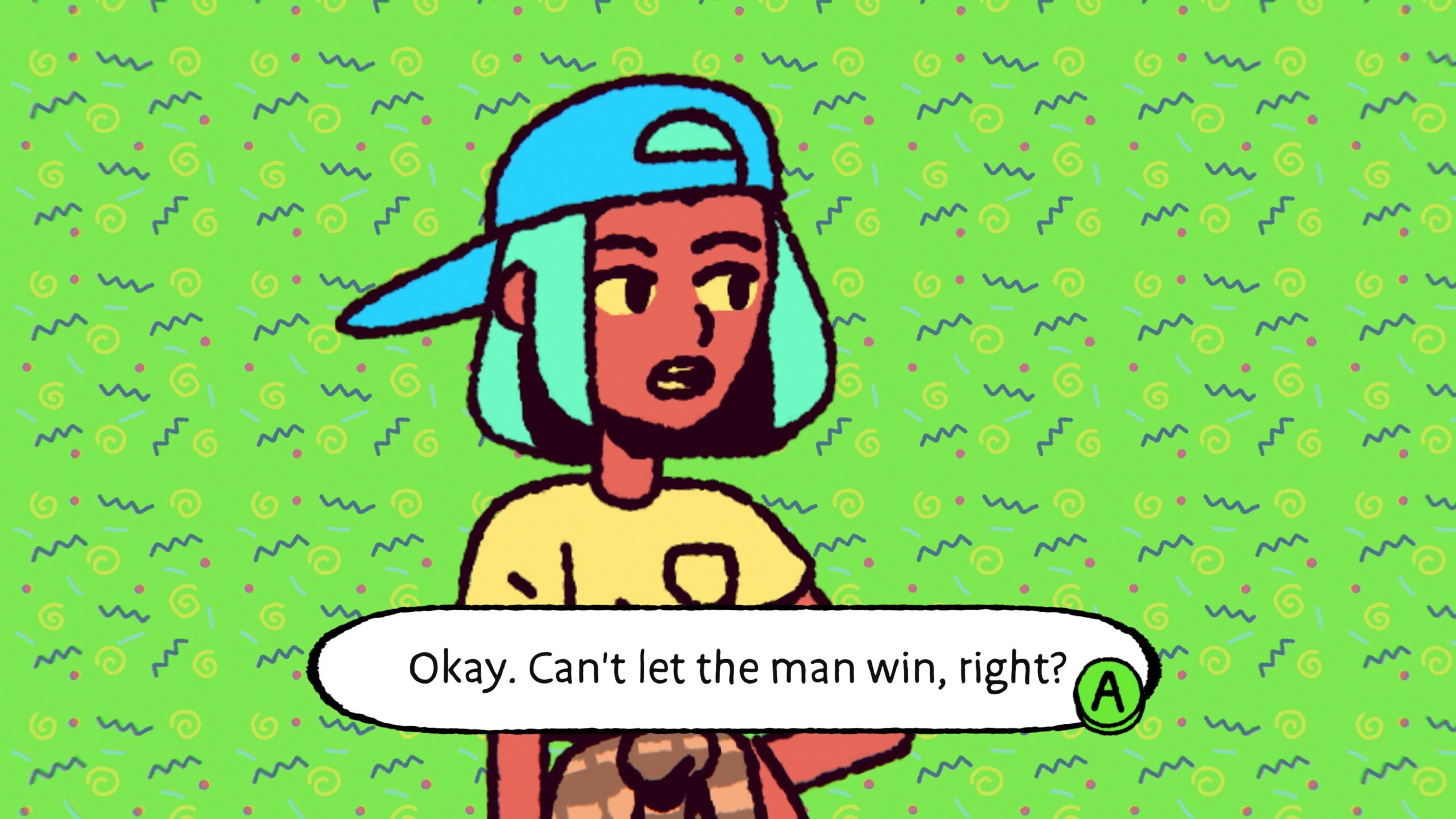
From there, he says his love for con art movies made it “a natural fit” to shape The Big Con into an adventure game.
“It was something I always wanted to do and I always wanted to experiment with non-linear adventure gameplay. Instead of ‘there’s the door, how do I find the key?’ it’s ‘this is the amount of money that I need to get through,’ he says. “I wanted to have something where you could do a bunch of little quests and that would contribute to a goal. And a very kind of natural design affordance for that is money.”
While Proctor notes that The Big Con isn’t 100 percent open and systemic, he says the game does offer some freedom in how you approach your grifts. This means that Ali will be able to go around and pickpocket people for small amounts of money or take on quests that can involve elaborate disguises or breaking and entering for greater rewards.
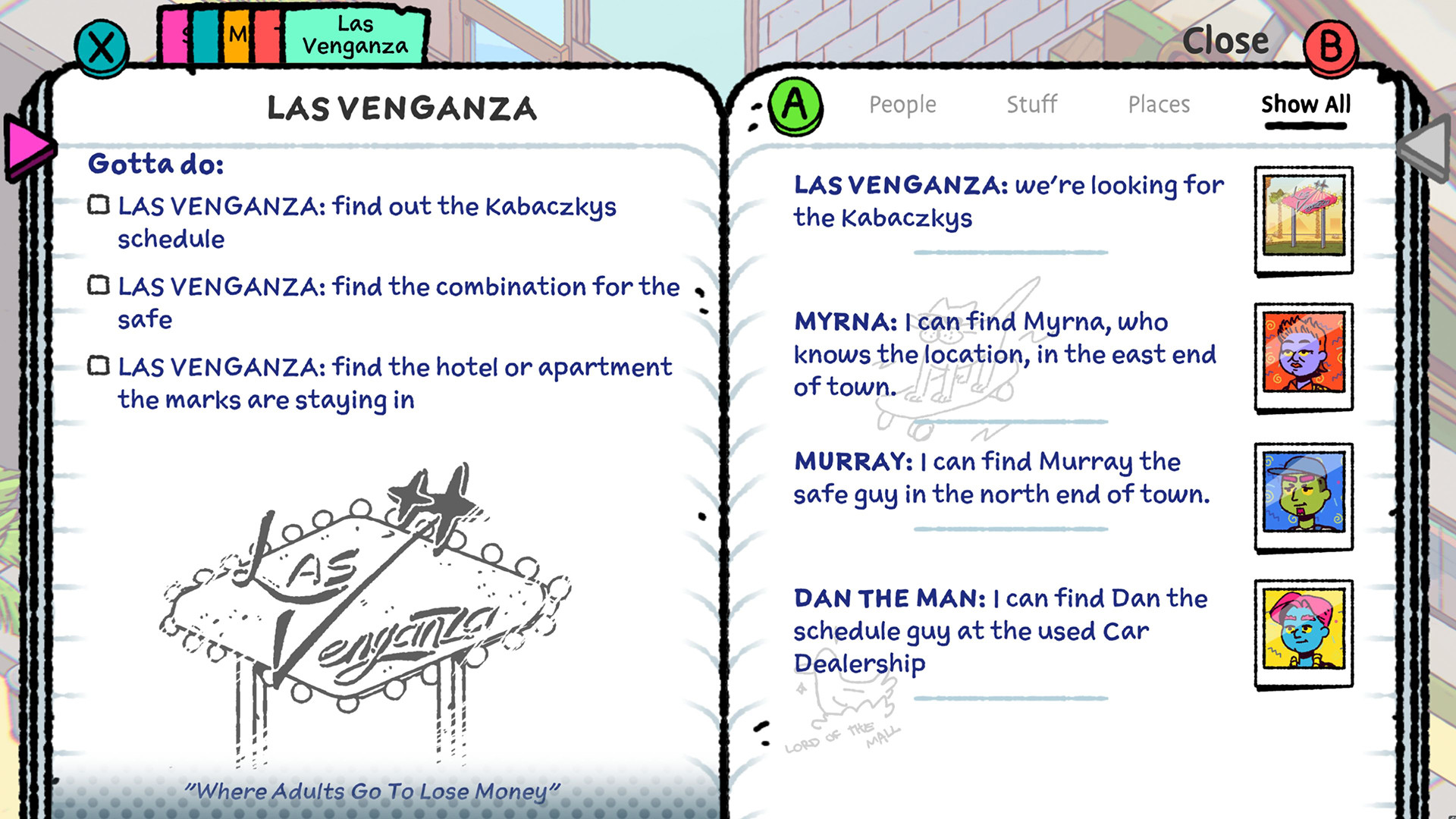
“If you do the thing that you have to do, do you also do these things on the side? Or do you instead only do the things on the side?” he says of the game’s design philosophy.
“Every character has their own sort of voice, even if they only talk for one or two lines. And you run around and you stumble on something and someone’s talking about something, and you’re like, ‘oh, I wonder if I can engage with that.’ It’s definitely a bit more open-ended.”
Players also don’t have to worry about some of the other limitations that might be found in other games, Proctor says. “I’m not putting a clock on you and there’s no morality metre. It’s just like ‘what do you want to do?”
In the case of The Big Con, the concept of morality is an interesting one, as Proctor notes the game’s subject matter initially put off some people. During the Tribeca Games Spotlight, Proctor made a rather interesting statement about the difficulties of pitching a game like The Big Con that focuses on non-violent crime. “Games with guns don’t bat an eye, but the moment you have to steal an old lady’s wallet, people start to think maybe there’s something wrong with you,” he said at Tribeca.
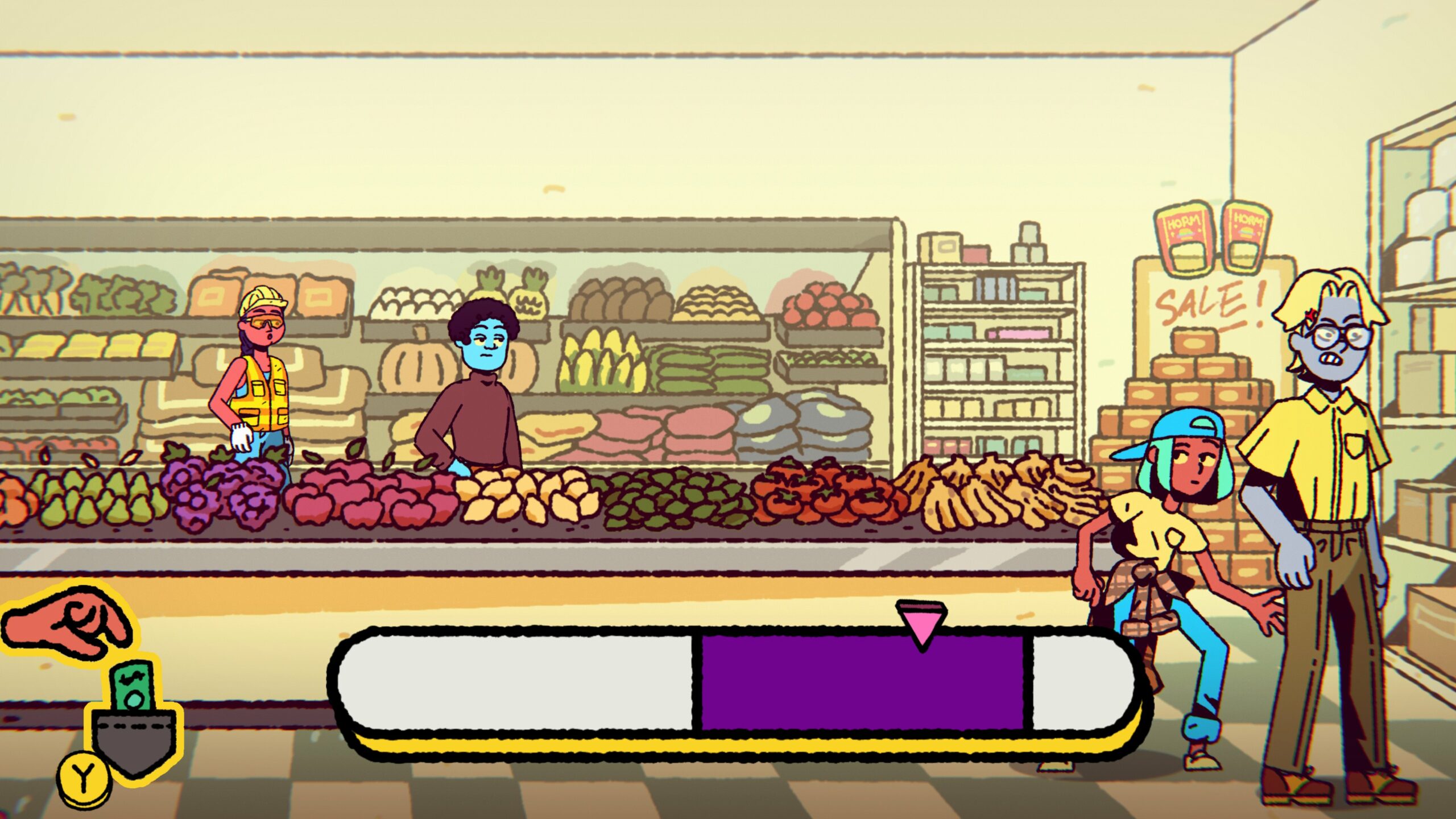
When asked to unpack that quote, Proctor notes that Mighty Yell did indeed encounter some resistance from publishers it had met with.
“There was some pushback. I’m not gonna lie,” he admits. “Not a ton, [but] I will say that I met with a lot of different people that saw something in the game and didn’t see something else.” He says Skybound, the publisher of The Big Con, is an example of the former, but there were several others who didn’t vibe with the game’s concept.
“There were also people that we met and they’re like, ‘well, this isn’t nice.’ Or they would either say ‘no, this is morally obtuse,’ or they would say, ‘I don’t want a game without combat.’ And those were the two things that we kind of batted back and forth. We did not flinch.”
Proctor says this hesitation towards games like The Big Con is emblematic of the broader video game industry’s focus on more action-packed experiences. “I do believe our industry is very reliant on violence as core mechanic,” he says. “And I have zero judgment for those kinds of games — just me, personally, and the team at Mighty Yell want to try to do something a little bit different when we can.”
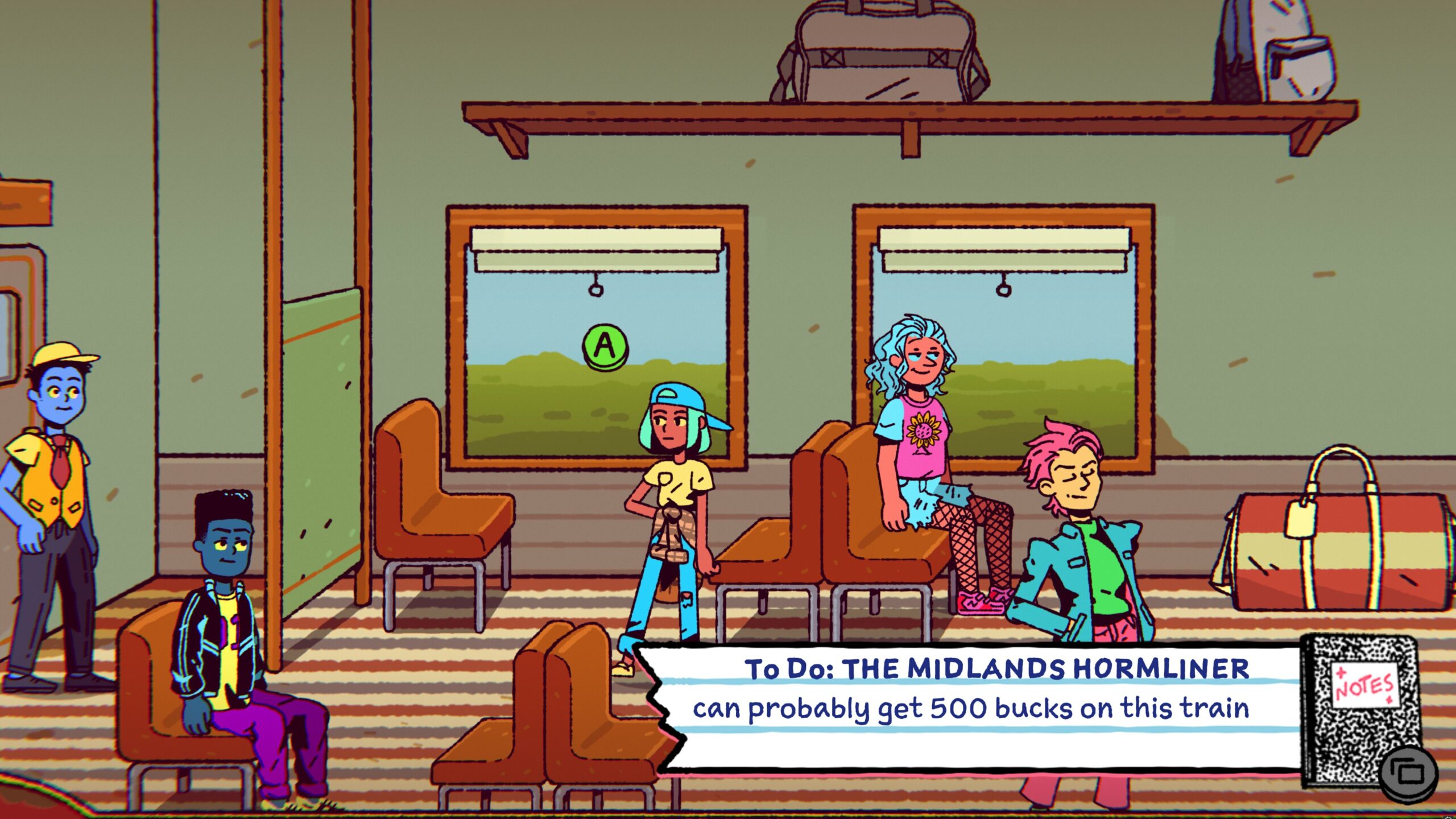
For Proctor, this meant using the story of a teenager turning to crime to save her mother’s livelihood to serve as a commentary on the struggles of small businesses.
“I think a lot about local economies and stuff like that. I live in a corner of Toronto and we’ve got a great little general store and sells a bunch of rad social justice books and stuff for kids. And, like, if I give them money, then the money stays here, and they support each other. And that is a positive thing to me because those people live here, and then they bring money to other folks.”
He says this has only become even more important after small businesses were hit particularly hard due to COVID-19.
“During this pandemic, we’ve had a huge disrespect for homeless people in Toronto — politically, anyways. And we also have a lot of love for big box stores, and those are not necessarily connected, but they are in terms of where we devote our energy to it,” he says. “I think it’s important to have conversations about what the little guy is doing and to draw attention to that. And I won’t spoil anything, but I do have a little bit of that conversation explicitly in the game, and I’m looking forward to people finding it.”
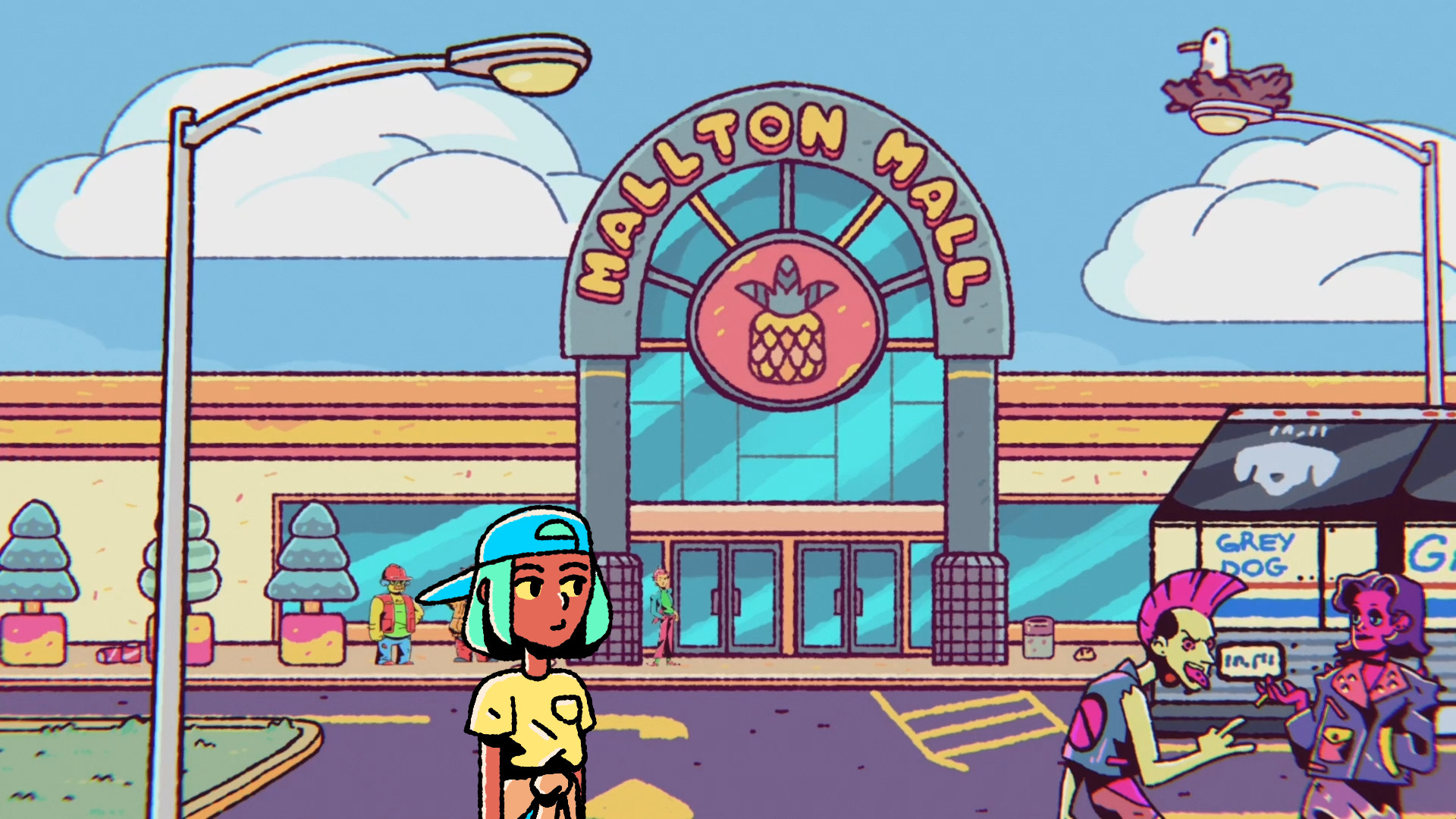
So far, though, he’s happy with the response from players who tried out the game during Tribeca and the Steam Next Festival.
“When we were sharing this game with some people, someone said to us, ‘I played this with my son who’s six. And he was like, ‘don’t steal from those people because they’re nice, but this guy’s mean. And they had a father-son conversation about why is Ali doing what she’s doing and what does it mean to steal? And is it right? Or is it wrong?’” he says.
“And they didn’t necessarily come to a conclusion or an answer, and that’s cool — that’s a good thing to me. I think if we can do something a little bit different, if we can make people have those questions, then that’s a positive thing.”
The Big Con will release on Xbox One and PC (Steam) this summer.
This is the latest entry in our monthly Canadian developer interview series. Last month’s feature, which focused on the noir detective adventure Backbone, can be found here.
For all the latest Technology News Click Here
For the latest news and updates, follow us on Google News.
